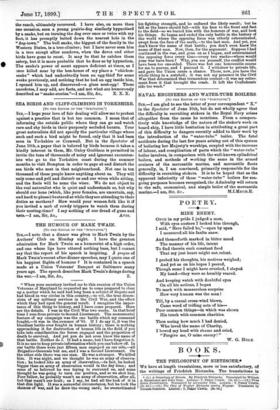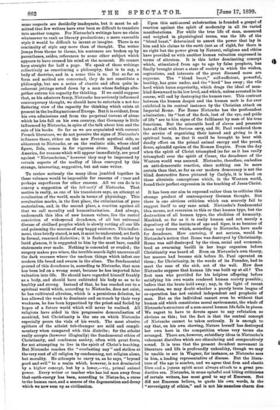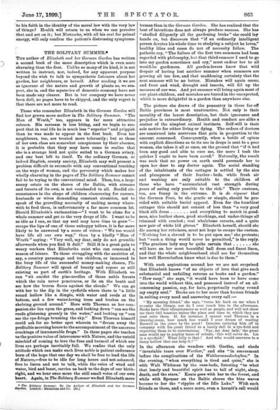BOOKS.
THE PHILOSOPHY OF NIETZSCHE., WE have at length translations, more or less satisfactory, of the writings of Friedrich Nietzsche. The translations in * (1.) A Genealogy of Morals. By Friedrich Nietzsche. Translated by William A. Haussmann and John Gray. London : T. Fisher Unwln. 6d.]—(2.) Thus Spoke Zarathustra. Translated by Alexander Tills. London : T. Fisher Unvrin, 6d.]—(3.) The Case of "Wagner Nietzsche contra Wagner. Translated by Thomas Common. Loudon : T. Haber Unto. 6d.3
some respects are decidedly inadequate, but it must be ad- mitted that few writers have ever been so difficult to translate into another tongue. For Nietzsche's writings have no claim whatsoever to rank as literary productions ; a more execrable style it would be difficult to invent or imagine. There is no continuity of style any more than of thought. Tha writer jumps from theme to theme, his sentences are broken up by parentheses, asides, references to some other subject which appears to have crossed his mind at the moment. He cannot keep straight for half a page. We speak of these writings collectively as constituting a philosophy, that is to say, a body of doctrine, and in a sense this is so. But so far as form and method are concerned, they do not constitute a philosophy, but are a series of chaotic and often quite in- coherent jottings noted down by a man whose feelings alto- gether outrun his capacity for thinking. If we could suppose that, as his admirers fancy, Nietzsche has seriously influenced contemporary thought, we should have to entertain a not too flattering view of the capacity for thinking which exists at present in the leadingnations of Europe. But it is evident, from his own admissions and from the perpetual torrent of abuse which he lets fall on his own country, that Germany is little influenced by Nietzsche, in spite of the talk about him and the sale of his books. So far as we are acquainted with current French literature, we do not perceive the signs of Nietzsche's influence there, either on the new French mystical side, so abhorrent to Nietzsche, or on the realistic side, whose chief figure, Zola, comes in for vigorous abuse. England and America, for reasons which will appear immediately, are proof against " Nietzscheism," however they may be impressed by certain aspects of the medley of ideas conveyed by this strange, interesting, suggestive, but not sane writer.
To review seriously the many ideas jumbled together in these volumes would be impossible for reasons of mace and perhaps superfluous for other reasons. All we can do is to convey a suggestion of the leit-motif of Nietzsche. That motive is really, as one of his translators says, an attempt at revaluation of the world, made in terms of physiology. This revaluation marks, in the first place, the culmination of pure materialism, and, in the second place, a reaction against all that we call morality and humanitarianism. And always, underneath this idea of new human values, lies the rooted conviction of widespread decadence, of all but universal disease of civilised peoples which is slowly rotting all our life and poisoning the sources of any happy existence. This indict- ment, thus briefly stated, is not, it must be understood, set forth in formal, reasoned dialectics ; it is flashed on the reader by lurid glances, it is suggested to him by the most bare, candid statements ever made. Nothing is concealed or evaded ; the surgery makes you wince, the terrible search-light uncovers all the dark recesses where the unclean things which infest our modern life breed and swarm in the slime. The fundamental ground of this decadence is, according to Nietzsche, that man has been led on a wrong scent, because he has imported false valuation into life. He should have regarded himself frankly as a body, and should have cultivated his body so as to be healthy and strong. Instead of that, he has reached out to a spiritual world which, according to Nietzsche, does not exist, be has cultivated altruism, which is a pernicious delusion, he has allowed the weak to dominate and en3roach by their very weakness, he has been hypnotised by the priest and fooled by hopes of a future world which will never be realised. All religions have aided in this progressive demoralisation of mankind, but Christianity is the one on which Nietzsche especially pours the vials of his wrath. The most abusive epithets of the atheist tub-thumper are mild and compli- mentary when compared with this diatribe ; for the atheist really accepts (however illogically) the fundamental ethics of Christianity, and condemns society, often with great force, for not attempting to live in the spirit of Christ's teaching. But Nietzsche reaches the "everlasting nay" and strikes at the very root of all religion by condemning, not religion alone, but morality. He attempts to carry us, as he says, " beyond good and evil" to a realm which, however, is not dominated by a higher concept, but by a lower,—viz., primal animal power. Every writer or teacher who has led man away from that earth-energy has been, according to Nietzsche, a curse to the human race, and a source of the degeneration and decay which we now sum up as civilisation. Upon this anti-moral substruction is founded a gospel of reaction against the spirit of modernity in all its varied manifestations. For while the true life of man, measured and weighed in physiological terms, was the life of the "blond beast," determined to assert the power that lay in him and his claims to the earth (not as of right, for there is no right but the power given by Nature), religions and ethics have provided us with another human valuation expressed in terms of altruism. It is this latter dominating concept which, stimulated from age to age by false prophets, has finally brought about a state of society in which the wishes, aspirations, and interests of the great diseased mass are supreme. The " blond beast," self-sufficient, powerful, healthy, has gone under, and the " herd " has sway ; the vile herd which hates superiority, which drags the ideal of man- kind downward to its low level, and which, unless arrested in its course, will end by destroying the human race. This contrast between the human despot and the human mob is for ever exhibited in its central instance by the Christian attack on Imperial Rome. For Rome Nietzsche has the profoundest admiration; its "lust of the flesh, lust of the eye, and pride of life" are to him signs of the fulfilment by man of his true functions. But the miserable herd of slaves and peasants hate all that with furious envy, and St. Paul rendered them the service of organising their hatred and giving to it a spiritual basis, so that it could be brought to bear with deadly effect on the primal animal energy and the proud, fierce, splendid egoism of the Roman Empire. From the day when the spirit of Christ triumphed (so far as it has really triumphed) over the spirit of Caesar, the decadence of the Western world was assured. Nietzsche, therefore, embodies an anti-democratic reaction, since nothing can be more certain than that, so far as our modern democracy is not the blind destructive force pictured by Carlyle, it is based on those altruistic conceptions which, in the Western world, found their perfect expression in the teaching of Jesus Christ.
It has been our aim to expound rather than to criticise this strange product of contemporary German thought. But there is one obvious criticism which can scarcely fail to suggest itself to any sane mind. Nietzsche's fundamental idea means, not reversion to this or that human type, but the destruction of all human types, the abolition of humanity. Mankind, so far as it is really human and not merely a depository of the instincts of ape and tiger, is so because of these very forces which, according to Nietzsche, have made for decadence. How amusing, if not serious, would be Nietzsche's notion that Rome was destroyed by Christianity. Rome was self-destroyed by the vices, social and economic, bred as swarming bacilli in her huge organism before Christianity was heard of. Even on Nietzsche's own theory, her masses had become sick before St. Paul operated on them ; for Christianity, in the words of its Founder, had to meet the case of the sick, not of the well. How does Nietzsche suppose that human life was built up at all ? The first man who provided for his helpless offspring before satisfying his own wants rendered human society possible ; before that the brute held sway; nay, in the light of recent researches, we may doubt whether a purely brute league of co-operation has not existed independent and prophetic of man. But as the individual cannot even be without that human aid which constitutes moral environment, the whole of Nietzsche's structure of a non-moral human life falls in pieces. We regret to have to devote space to any refutation so obvious as this ; but the fact is that the central concept of Nietzsche cannot be taken seriously. It is enough to say that, on his own showing, Nature herself has destroyed her own hero in the competition whose very terms she arranged. There are, however, subsidiary ideas in Nietzsche's vehement diatribes which are stimulating and comparatively sound. It is true that the present decadent movement in literature and life is profoundly unhealthy, though we may be linable to see in Wagner, for instance, as Nietzsche sees in him, a leading representative of disease. But the litera- ture of the age is sombre, and we agree that firm and elastics fibre and a joyous spirit must always attach to a great pro- ductive era. Nietzsche, in some spiteful and biting criticisms of certain writers, has most good to say of Emerson. But did not Emerson believe, to quote his own words, in the "sovereignty of ethics," and is not his nameless charm due
to his faith in the identity of the moral law with the very law of things P Health will return to us when we can perceive that and act on it; but Nietzsche, with all his zeal for primal energy, will only confirm the patient's distressing symptoms.








































 Previous page
Previous page